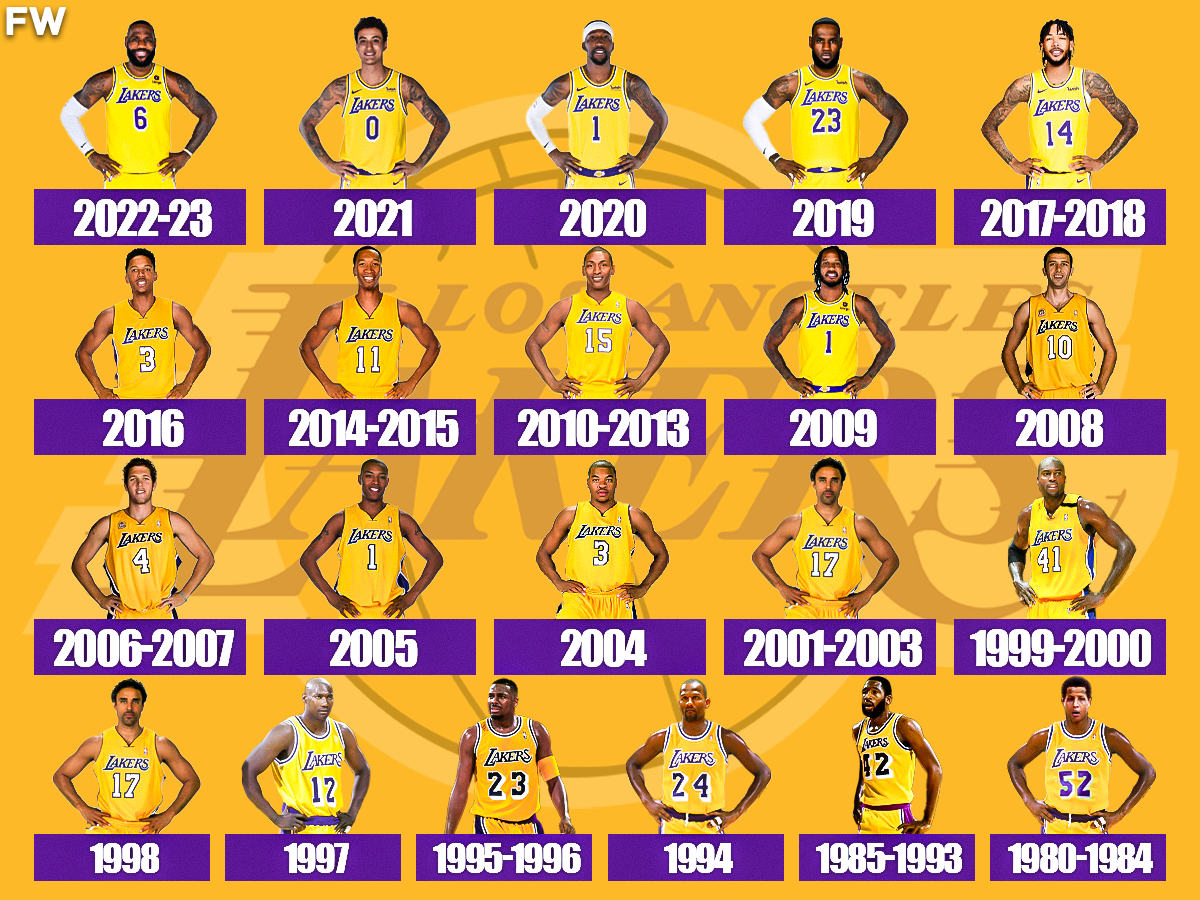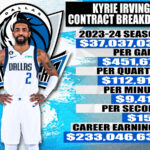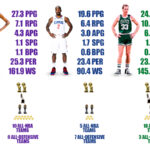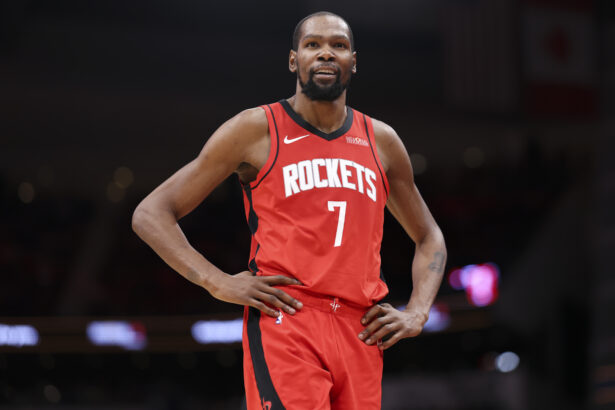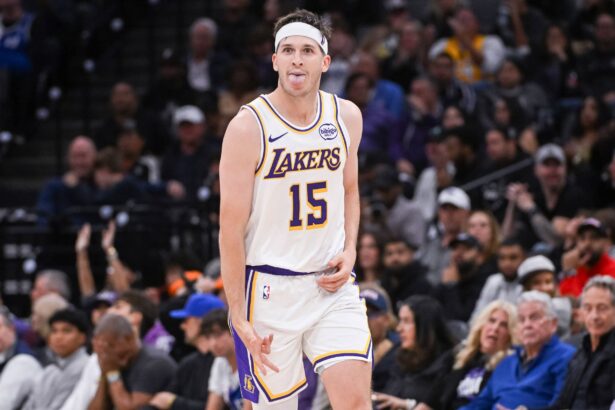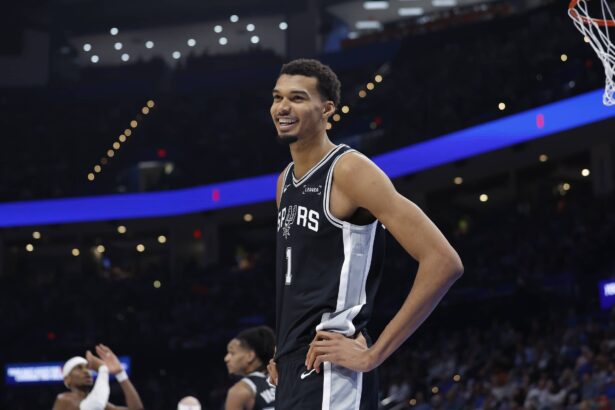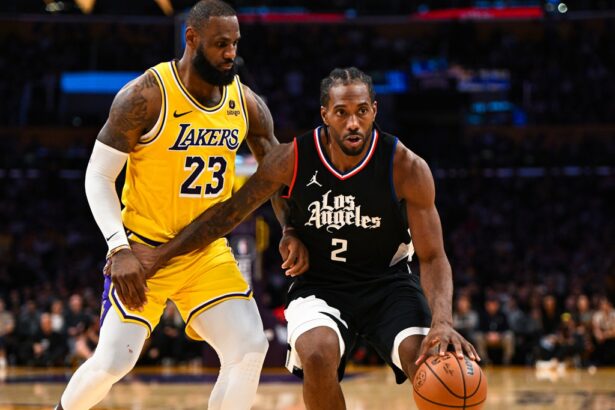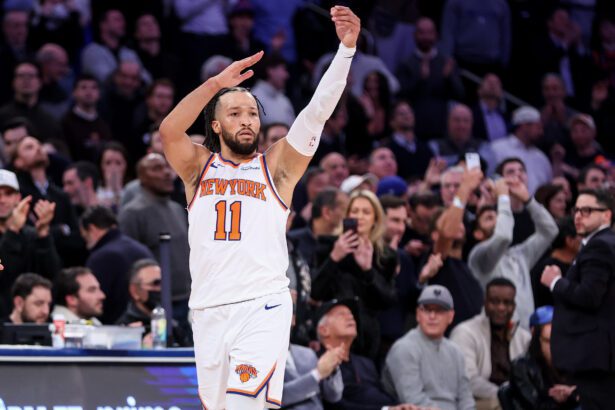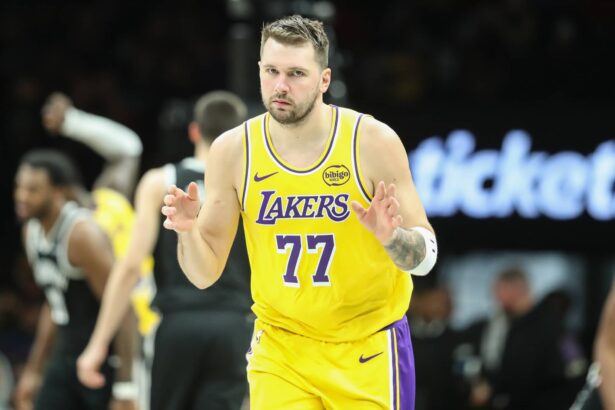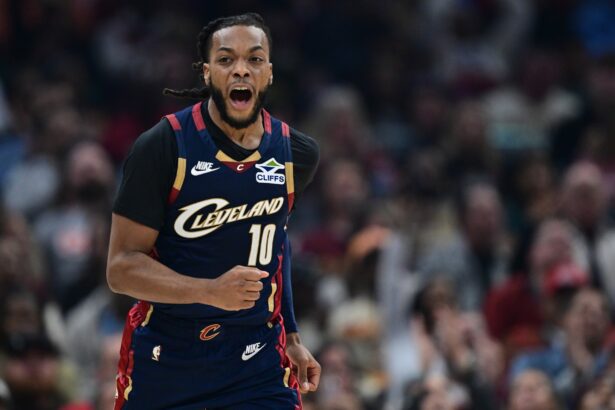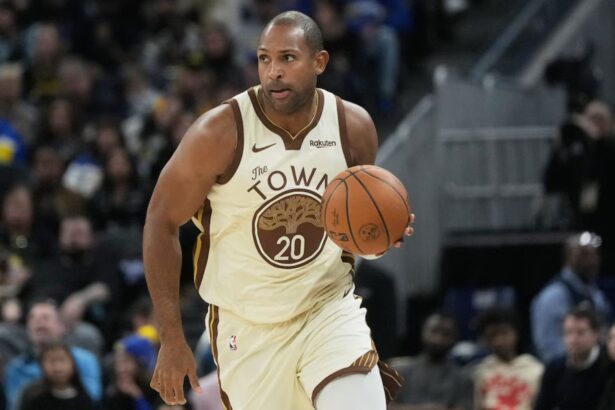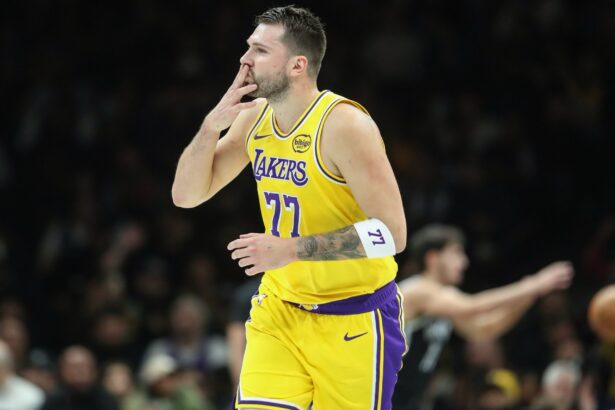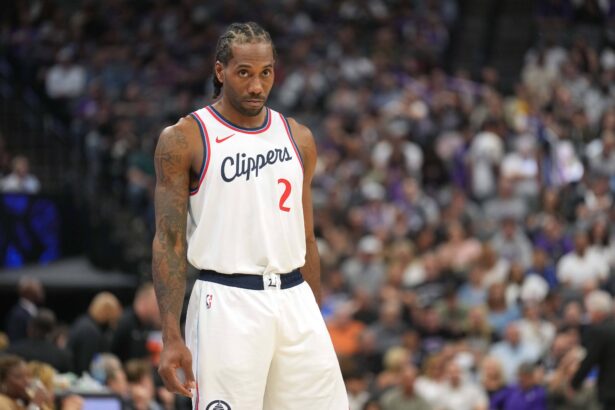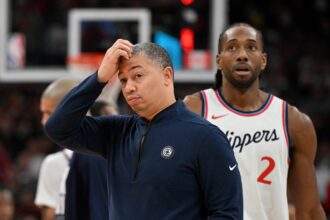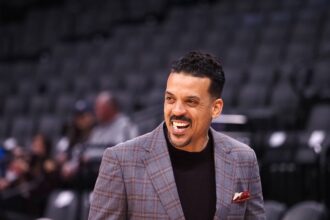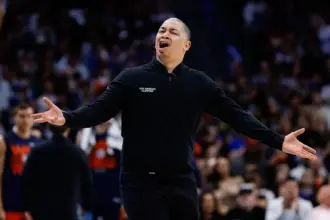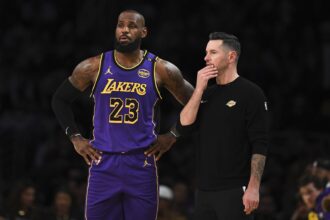- LeBron James has played many roles with the Lakers including as a small forward
- Los Angeles has always kept their wing players at the forefront of perimeter defense
- Some of the most clutch players in Lakers history have been small forwards
The Los Angeles Lakers have been through countless starting lineup changes dating back to 1980 when the “Showtime” Lakers were slowly becoming a dominant force in the NBA. Since then, the Lakers’ starting small forward position has been a focal point of pure defense, aggression, and consistency.
- 1980-1984: Jamaal Wilkes
- 1985-1993: James Worthy
- 1994: George Lynch
- 1995-1996: Cedric Ceballos
- 1997: Jerome Kersey
- 1998: Rick Fox
- 1999-2000 – Glen Rice
- 2001-2003: Rick Fox
- 2004: Devean George
- 2005: Caron Butler
- 2006-2007: Luke Walton
- 2008 – Vladimir Radmanovic
- 2009: Trevor Ariza
- 2010-2013: Metta World Peace
- 2014-2015: Wesley Johnson
- 2016: Anthony Brown
- 2017-2018: Brandon Ingram
- 2019: LeBron James
- 2020: Kentavious Caldwell-Pope
- 2021: Kyle Kuzma
- 2022-24: LeBron James
In this comprehensive exploration, we delve into the captivating journey of the Los Angeles Lakers starting small forwards from 1980 to 2024. After seeing how the point guard position went through so many changes between 1980 and 2024 and how the shooting guard position was stable thanks to a superstar player, it is time to focus on the small forwards.
Join us as we revisit the remarkable careers, defining moments, and enduring legacies of the remarkable wing players who have donned the purple and gold, leaving an indelible mark on the Lakers’ rich tapestry of success.
1980-1984: Jamaal Wilkes
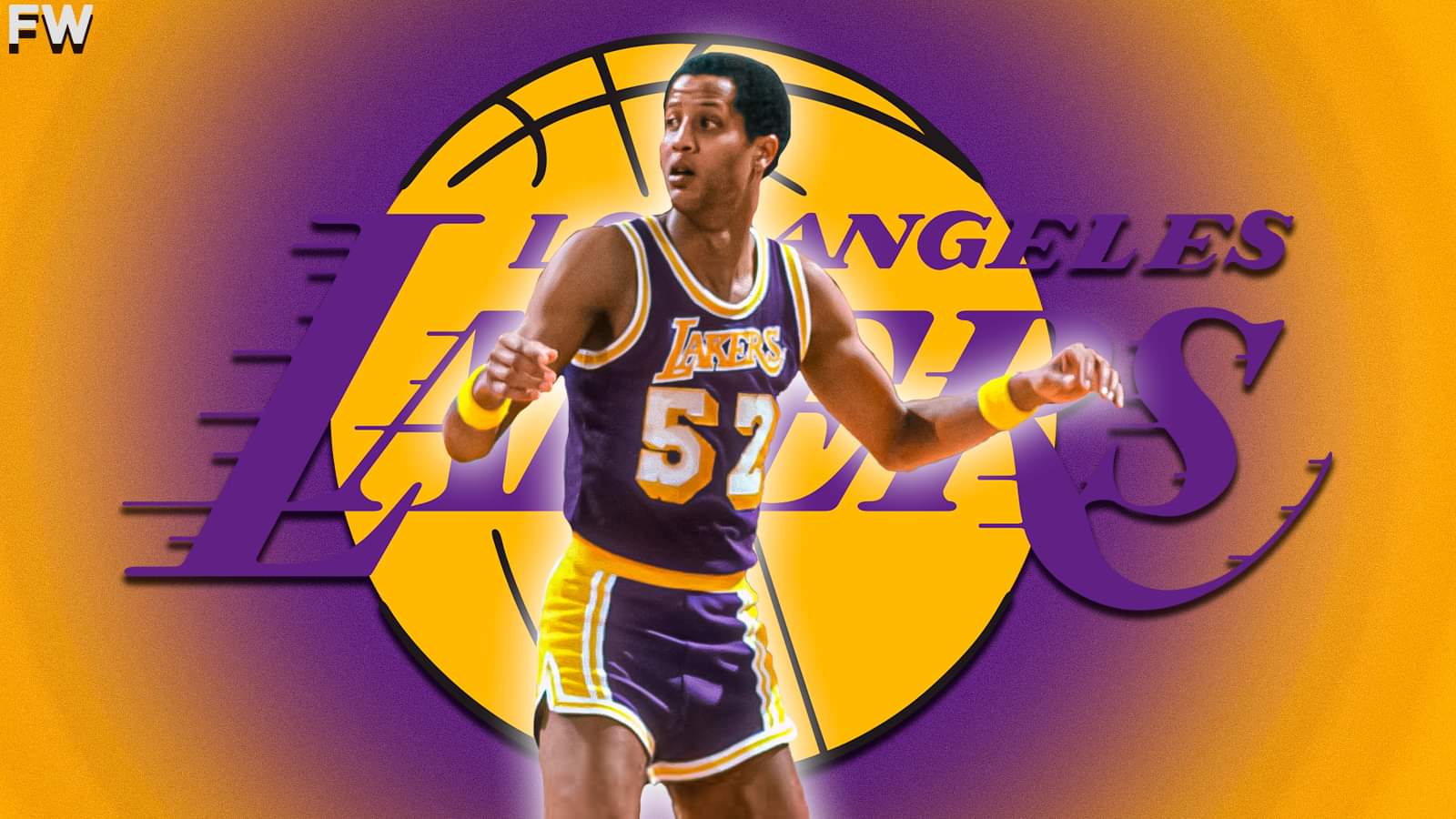
Career Stats With The Lakers: 18.4 PPG, 5.4 RPG, 2.6 APG, 1.2 SPG, 0.3 BPG
Career Achievements With The Lakers: 2x NBA Champion, 2x All-Star
During his tenure as the Los Angeles Lakers’ starting small forward from 1980 to 1984, Jamaal Wilkes proved to be a pivotal asset for the team. Offensively, he showcased his scoring prowess by averaging 18.4 points per game, adding depth to the Lakers’ offensive repertoire alongside Magic Johnson and Kareem Abdul-Jabbar over those years.
Defensively, Wilkes was no slouch, either. Averaging 1.2 steals per game, he was adept at creating turnovers and disrupting the opponent’s offense. While his shot-blocking numbers may not have been remarkable, his overall defensive presence was valuable to the Lakers.
One of the most significant markers of his Lakers’ career was his contribution to two NBA championships during this span. His ability to perform under pressure and contribute to winning basketball was unquestionable. Wilkes’ excellence also earned him All-Star recognition twice, a testament to his individual skills and his integral role within the team.
In essence, Jamaal Wilkes left an indelible mark on the Los Angeles Lakers’ history during his years as their starting small forward, combining offensive versatility, defensive prowess, and championship success into a remarkable legacy.
1985-1993: James Worthy
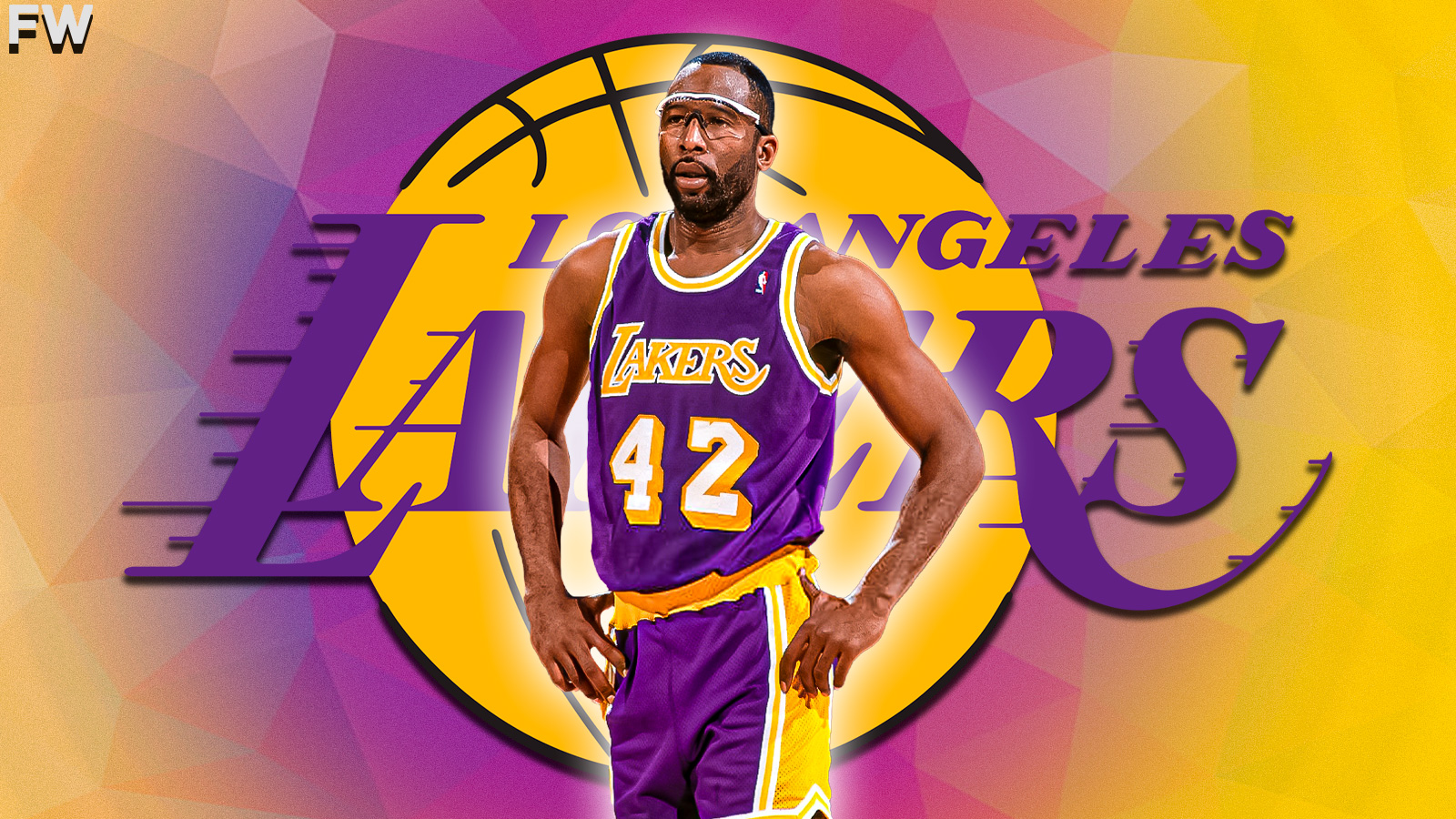
Career Stats With The Lakers: 17.6 PPG, 5.1 RPG, 3.0 APG, 1.1 SPG, 0.7 BPG
Career Achievements With The Lakers: 3x NBA Champion, 1987-88 Finals MVP, 7x All-Star, 2x All-NBA Team Selection, 1982-83 All-Rookie Team Selection
James Worthy’s reign as the Los Angeles Lakers starting small forward from 1985 to 1993 stands as a pivotal era in the team’s history. Offensively, Worthy’s prowess was undeniable, averaging an impressive 17.6 points per game as nothing more than the third option behind Magic and Kareem.
He was a dynamic scorer, renowned for his ability to electrify the game with fast-break finishes, a vital component of the Showtime Lakers. His versatility was evident, contributing 5.1 rebounds and 3.0 assists per game, showcasing his multifaceted game as a wing player. Defensively, Worthy was equally impactful, averaging 1.1 steals per game and frequently disrupting opponents’ plays.
His defensive tenacity was vital to the Lakers’ overall success during this period. Notably, Worthy played a pivotal role in securing three NBA championships (1985, 1987, and 1988), earning him the moniker “Big Game James” for his clutch performances in critical moments.
Worthy’s greatest moments had to come in the 1988 NBA Finals when the Lakers battled the Detroit Pistons over a 7-game series. The swingman averaged 22.0 points, 7.4 rebounds, and 4.4 assists per game in the series along with a closeout performance in Game 7 for the ages. Big Game James dropped 36 points and 16 rebounds in Game 7 to earn Finals MVP honors and capture his third NBA championship.
1994: George Lynch
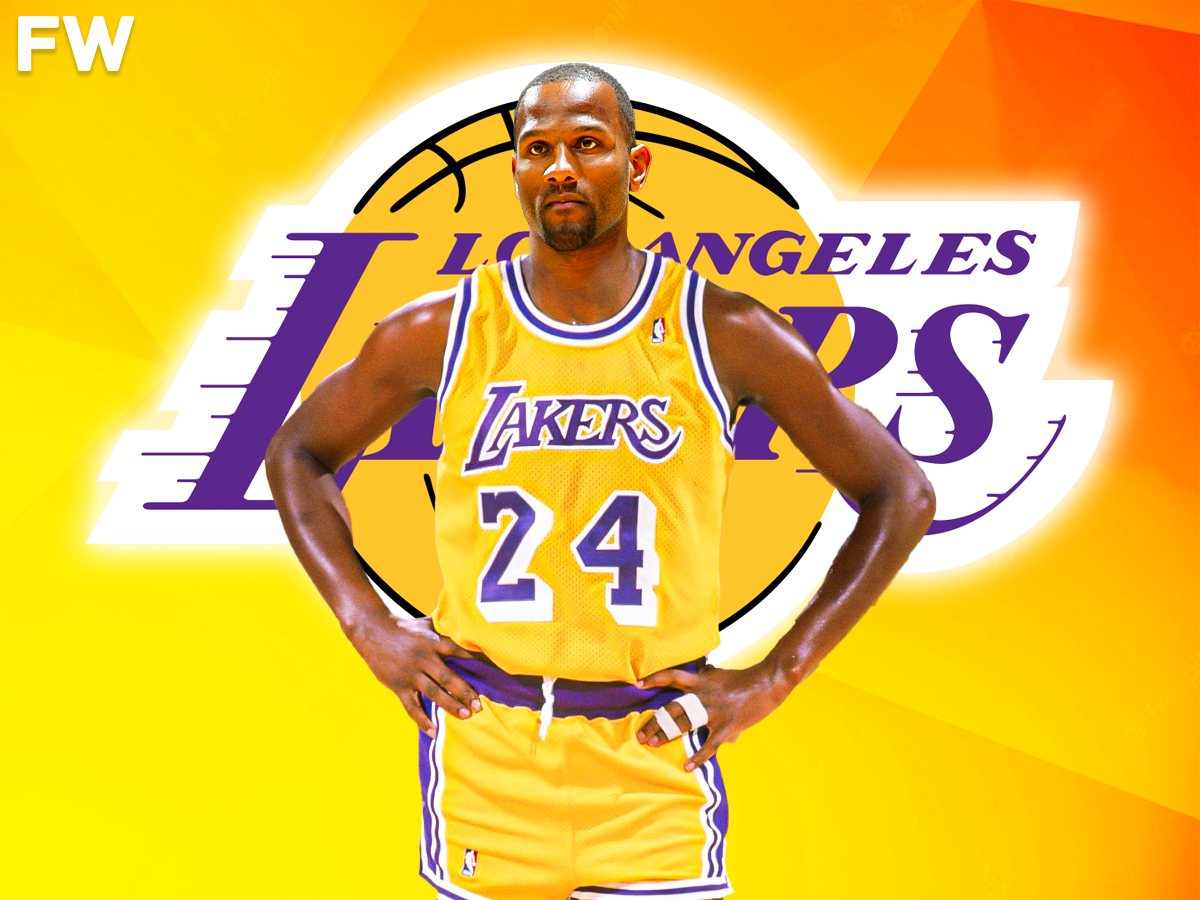
Career Stats With The Lakers: 6.5 PPG, 4.0 RPG, 1.0 APG, 1.0 SPG, 0.2 BPG
Career Achievements With The Lakers: N/A
George Lynch’s one-year role as the Los Angeles Lakers’ starting small forward in 1994 was characterized by his defensive tenacity and his contributions during a transitional phase for the franchise. Lynch was primarily recognized for his ability to disrupt opponents’ plays and guard multiple positions with his physicality and hustle. However, his offensive output was modest, averaging 6.5 points per game.
The 1994 season marked a period of adjustment for the Lakers as they were navigating life post-Showtime era. With legends like Magic Johnson and Kareem Abdul-Jabbar no longer on the roster, the team was in a rebuilding phase, and George Lynch was a part of this transitional period.
Although Lynch’s time with the Lakers did not lead to deep playoff runs or championship pursuits, his defensive contributions were appreciated as the team worked towards rebuilding and shaping its future identity.
1995-1996: Cedric Ceballos

Career Stats With The Lakers: 20.9 PPG, 7.3 RPG, 1.7 APG, 1.1 SPG, 0.3 BPG
Career Achievements With The Lakers: 1994-95 All-Star
Cedric Ceballos’ tenure as the Los Angeles Lakers’ starting small forward from 1995 to 1996 left an indelible mark on the franchise’s history. Renowned for his scoring prowess, Ceballos was a dynamic offensive force, averaging an impressive 20.9 points per game. His ability to create scoring opportunities and contribute in multiple facets of the game, exemplified by his 7.3 rebounds per game, made him a versatile asset for the team.
One of Ceballos’ most memorable traits was his athleticism and dunking ability, which often led to electrifying slam dunks that energized both fans and teammates. Despite his individual brilliance, the Lakers did not experience substantial team success during his tenure (second-round exit in 1995 and first-round exit in 1996), largely due to the competitive landscape of the Western Conference.
Nevertheless, Cedric Ceballos left a lasting legacy in Lakers lore, primarily as an offensive juggernaut who could ignite the crowd with his exciting plays. Ceballos made the All-Star Team in 1995 by averaging 21.7 points and 8.0 rebounds per game and made his mark as the starting swingman.
1997: Jerome Kersey
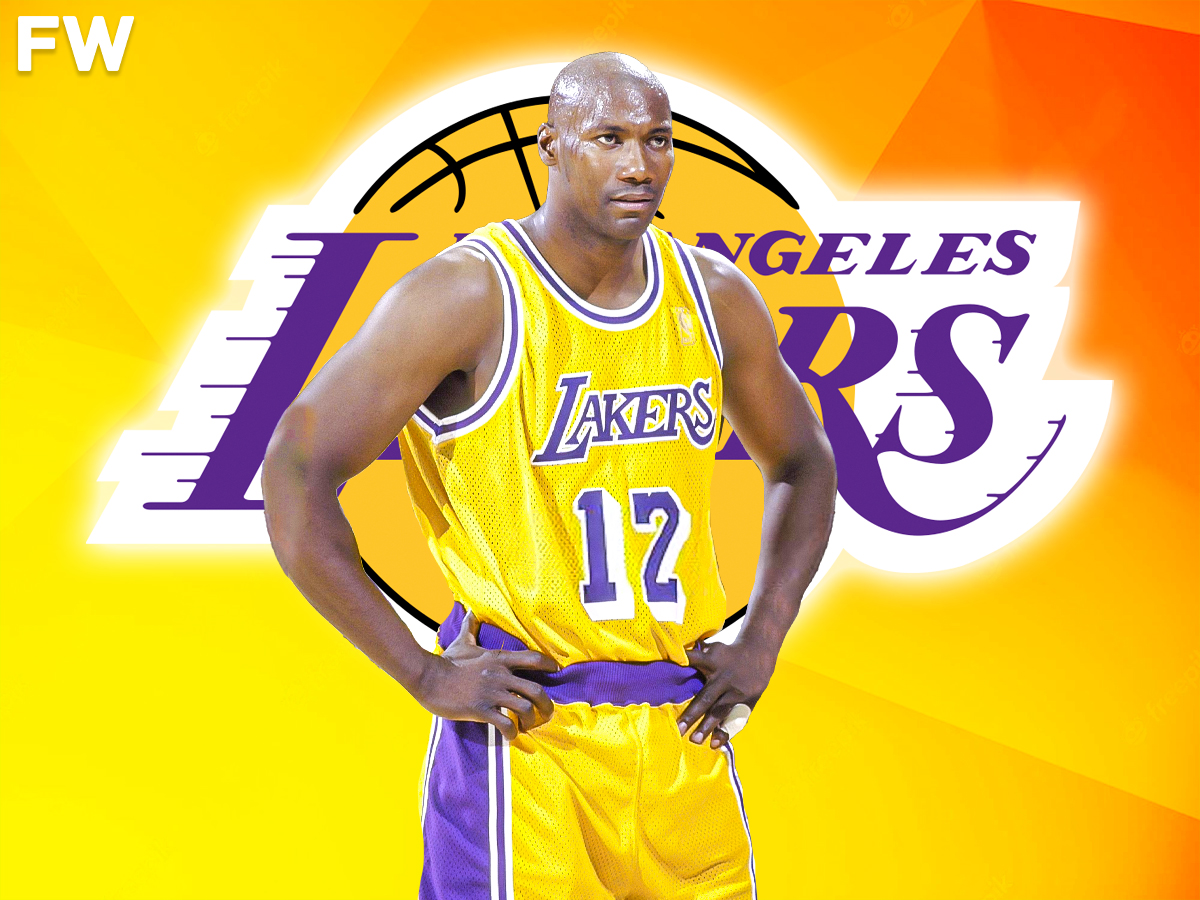
Career Stats With The Lakers: 6.8 PPG, 5.2 RPG, 1.3 APG, 1.7 SPG, 0.7 BPG
Career Achievements With The Lakers: N/A
Jerome Kersey’s short-lived tenure as the Los Angeles Lakers’ starting small forward in 1997 marked a pivotal transitional phase for the franchise. With a wealth of NBA experience, Kersey brought veteran leadership and defensive tenacity to the team. His gritty, physical style of play made him a valuable asset on the defensive end, providing a stabilizing presence during a season of change.
Offensively, Kersey’s contributions were modest, averaging 6.8 points per game, as he played a complementary role within the Lakers’ offensive schemes. However, his primary role extended beyond scoring; it was about nurturing player development and guiding the team through a rebuilding phase.
The 1997 season was challenging for the Lakers as they navigated significant roster changes and a shift in team dynamics. In this context, Kersey’s experience and defensive intensity played a crucial role in maintaining a competitive spirit and fostering growth among younger players.
Though his time with the Lakers may have been brief, his impact in providing stability and leadership during a season of transition remains a noteworthy chapter in the franchise’s history.
1998: Rick Fox
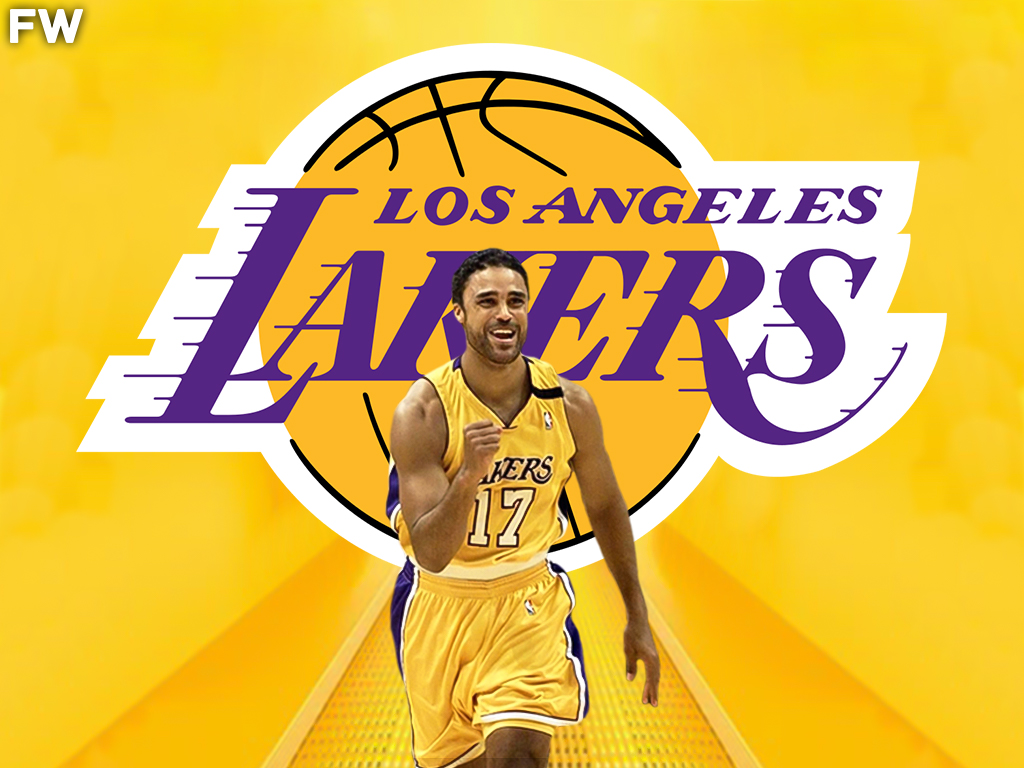
Career Stats With The Lakers: 8.7 PPG, 3.7 RPG, 2.9 APG, 0.9 SPG, 0.3 BPG
Career Achievements With The Lakers: 3x NBA Champion
Rick Fox’s arrival as the Los Angeles Lakers’ starting small forward in 1998 marked a turning point for the franchise. His versatility and two-way prowess became immediately evident as he made significant contributions on both ends of the court. Offensively, Fox averaged 8.7 points per game, displaying a reliable jump shot and the ability to create scoring opportunities, which added depth to the Lakers’ offensive arsenal.
However, it was Fox’s defensive excellence that truly set him apart. His capacity to guard multiple positions, disrupt passing lanes, and contest shots made him a linchpin of the Lakers’ defensive strategy. His tenacity and commitment to defense were invaluable to the team’s success.
Fox’s time with the Lakers was synonymous with championship glory although that would come a little later in the early 2000s. Beyond his on-court contributions, Fox’s role-player mentality and commitment to team chemistry were integral to the Lakers’ cohesiveness during their stint of trying to build around superstar center Shaquille O’Neal.
1999-2000 – Glen Rice
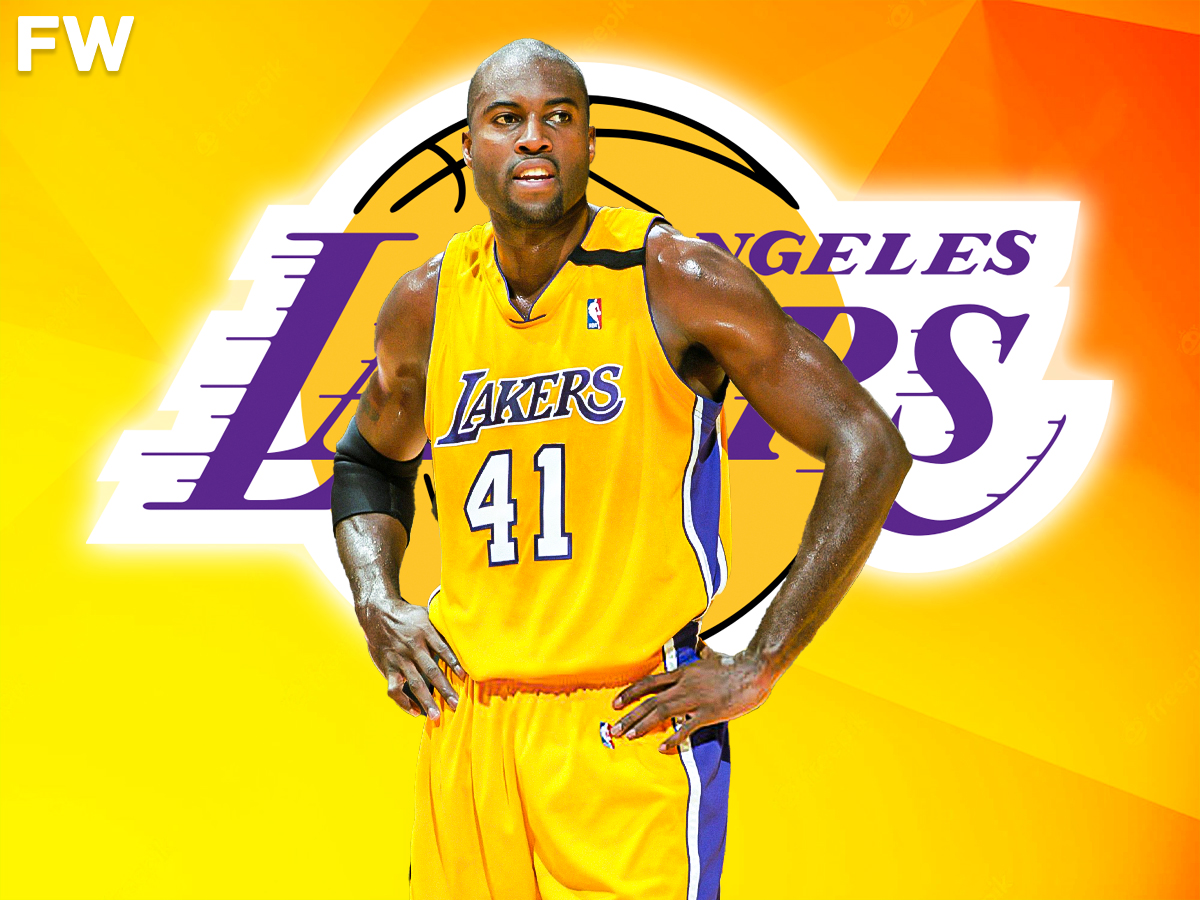
Career Stats With The Lakers: 16.3 PPG, 4.0 RPG, 2.3 APG, 0.6 SPG, 0.2 BPG
Career Achievements With The Lakers: 1999-00 NBA Champion
Glen Rice’s brief but impactful stint as the Los Angeles Lakers’ starting small forward during the 1999-2000 season left an indelible mark on the team’s championship journey. Renowned for his scoring prowess, Rice averaged 16.3 points per game, providing a crucial offensive spark alongside the dominant duo of Shaquille O’Neal and Kobe Bryant.
His three-point shooting acumen, in particular, was a game-changer, stretching opposing defenses and enhancing the Lakers’ offensive capabilities as he posted 37.6% from deep. Rice’s arrival in Los Angeles was pivotal, and he played a significant role in the Lakers’ successful quest for the NBA championship in his second season as a starter.
Glen Rice’s seasons as the starting small forward stands as a testament to his scoring prowess, three-point shooting, and the crucial part he played in bringing championship glory to Los Angeles in the memorable 1999-2000 campaign.
2001-2003: Rick Fox

Career Stats With The Lakers: 8.7 PPG, 3.7 RPG, 2.9 APG, 0.9 SPG, 0.3 BPG
Career Achievements With The Lakers: 3x NBA Champion
Rick Fox’s return as the Los Angeles Lakers’ starting small forward from 2001 to 2003 marked a continuation of his impactful tenure with the team. During these years, Fox brought his signature versatility, defensive acumen, and team-first mentality back to the Lakers’ roster. While his scoring numbers (8.7 points per game) were relatively modest, his contributions extended well beyond the stat sheet.
Fox’s defensive prowess remained a cornerstone of his game, and he continued to be a reliable defender, guarding some of the league’s toughest opponents. His ability to disrupt passing lanes, contest shots, and provide defensive stability complemented the Lakers’ star-studded lineup, which included Shaquille O’Neal and Kobe Bryant.
Championship success remained a constant theme during this period, as Fox was a key contributor to the Lakers’ NBA championships in 2001 and 2002. His ability to play his role effectively within the team’s system, providing both defensive intensity and timely scoring, was vital in achieving these titles.
2004: Devean George
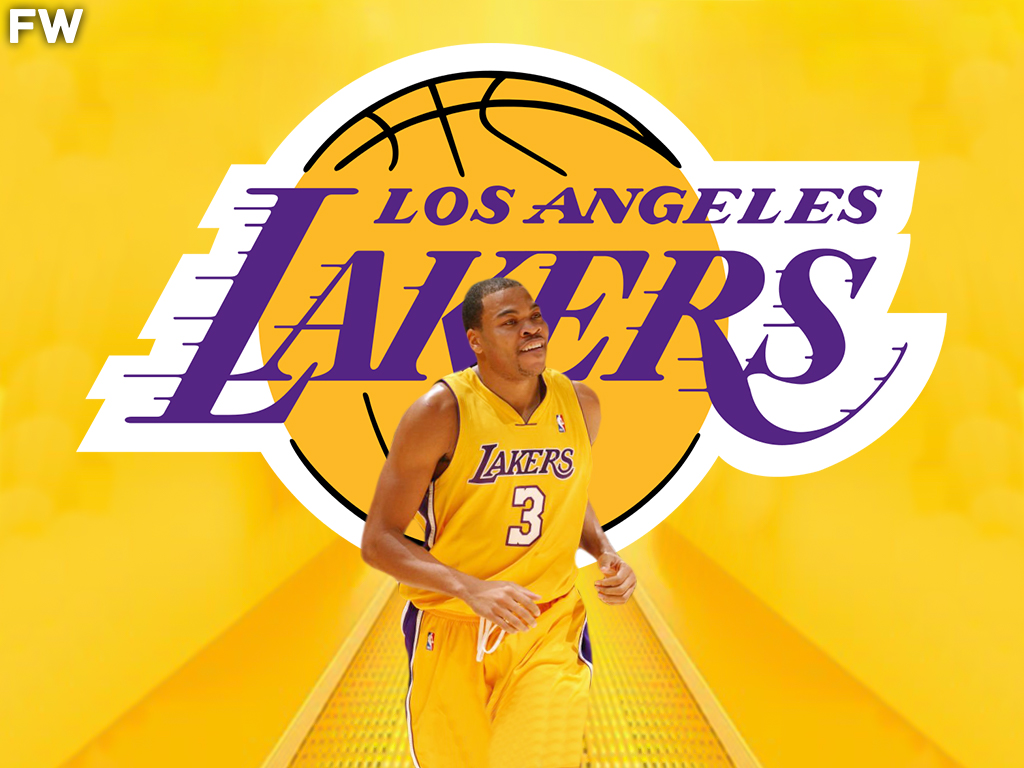
Career Stats With The Lakers: 6.0 PPG, 3.3 RPG, 1.0 APG, 0.7 SPG, 0.4 BPG
Career Achievements With The Lakers: 3x NBA Champion
Devean George’s role as the Los Angeles Lakers’ starting small forward in 2004 signified a transitional phase for the storied franchise. The team was in the midst of reshaping its identity after the departure of Shaquille O’Neal and a shift in the roster’s composition with the team bringing in veterans Gary Payton and Karl Malone during the season.
George’s contributions primarily manifested on the defensive end, where his versatility and ability to guard multiple positions were valuable assets. His offensive production, averaging 6.0 points per game, was modest but reflected his willingness to adapt to the team’s needs.
George’s presence on the Lakers carried a sense of championship pedigree, having been part of the team during its title-winning years in the early 2000s. Although the Lakers did not secure a championship in 2004 thanks to the Detroit Pistons, George’s experience and familiarity with the Lakers’ culture provided continuity during a period of change.
2005: Caron Butler
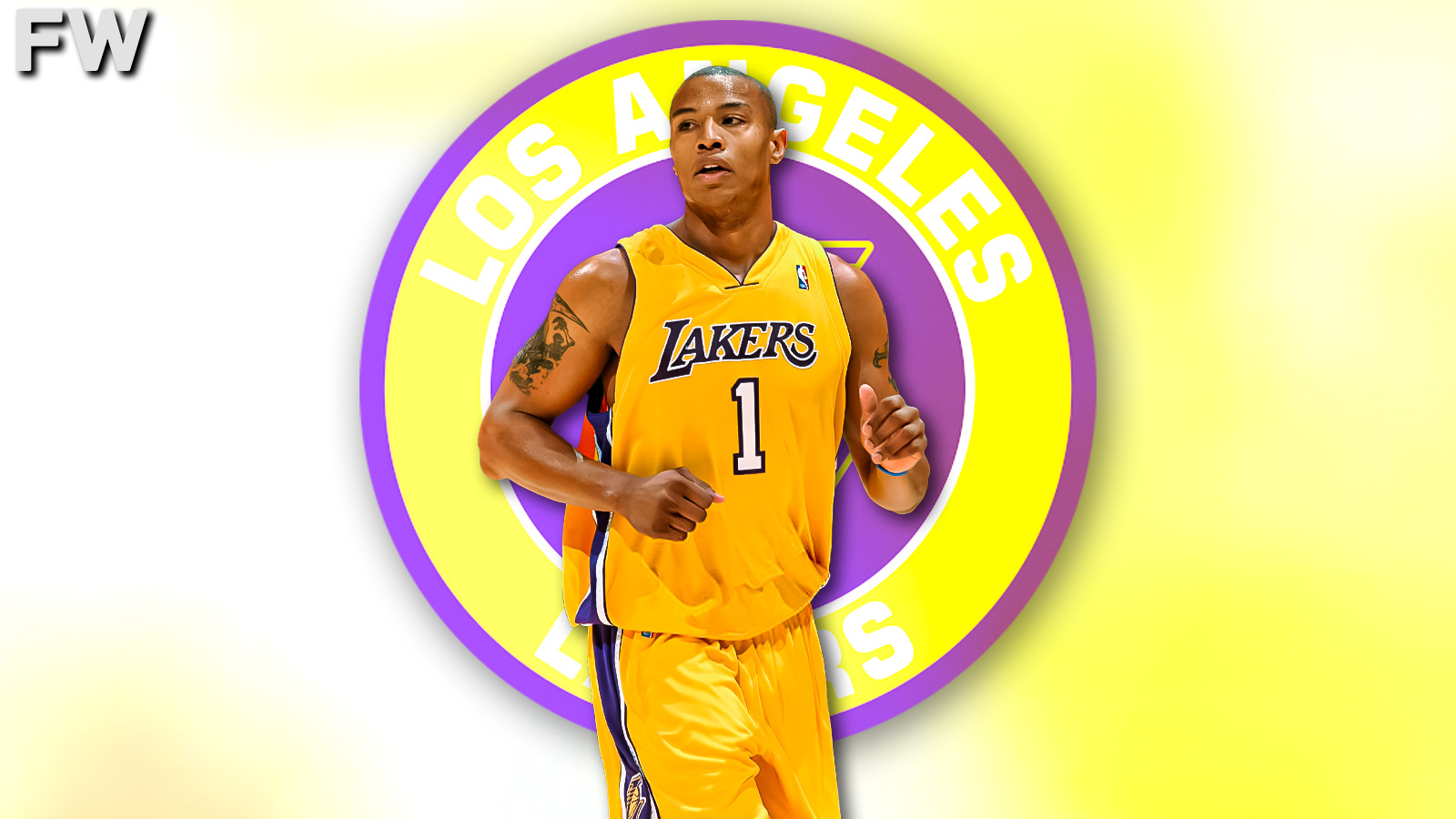
Career Stats With The Lakers: 15.5 PPG, 5.8 RPG, 1.9 APG, 1.4 SPG, 0.3 BPG
Career Achievements With The Lakers: N/A
Caron Butler’s arrival as the Los Angeles Lakers’ starting small forward in 2005 was marked by his scoring prowess, defensive tenacity, and youthful energy. Averaging 15.5 points per game, Butler quickly emerged as a key offensive contributor, adding depth to the Lakers’ scoring options.
His versatility on both ends of the court was a valuable asset, as he willingly took on the responsibility of guarding the opposing team’s top perimeter players while disrupting their offensive sets.
Butler’s youthful enthusiasm (24 years old in his third NBA season) injected a fresh dynamic into the Lakers’ roster, showcasing his athleticism and promise as a rising star in the league. His integration into the Lakers’ culture marked a transitional period for the team as they worked to blend new talent with experienced players and adapt to changing dynamics with Kobe Bryant left to do the scoring alone without Shaquille O’Neal by his side.
2006-2007: Luke Walton
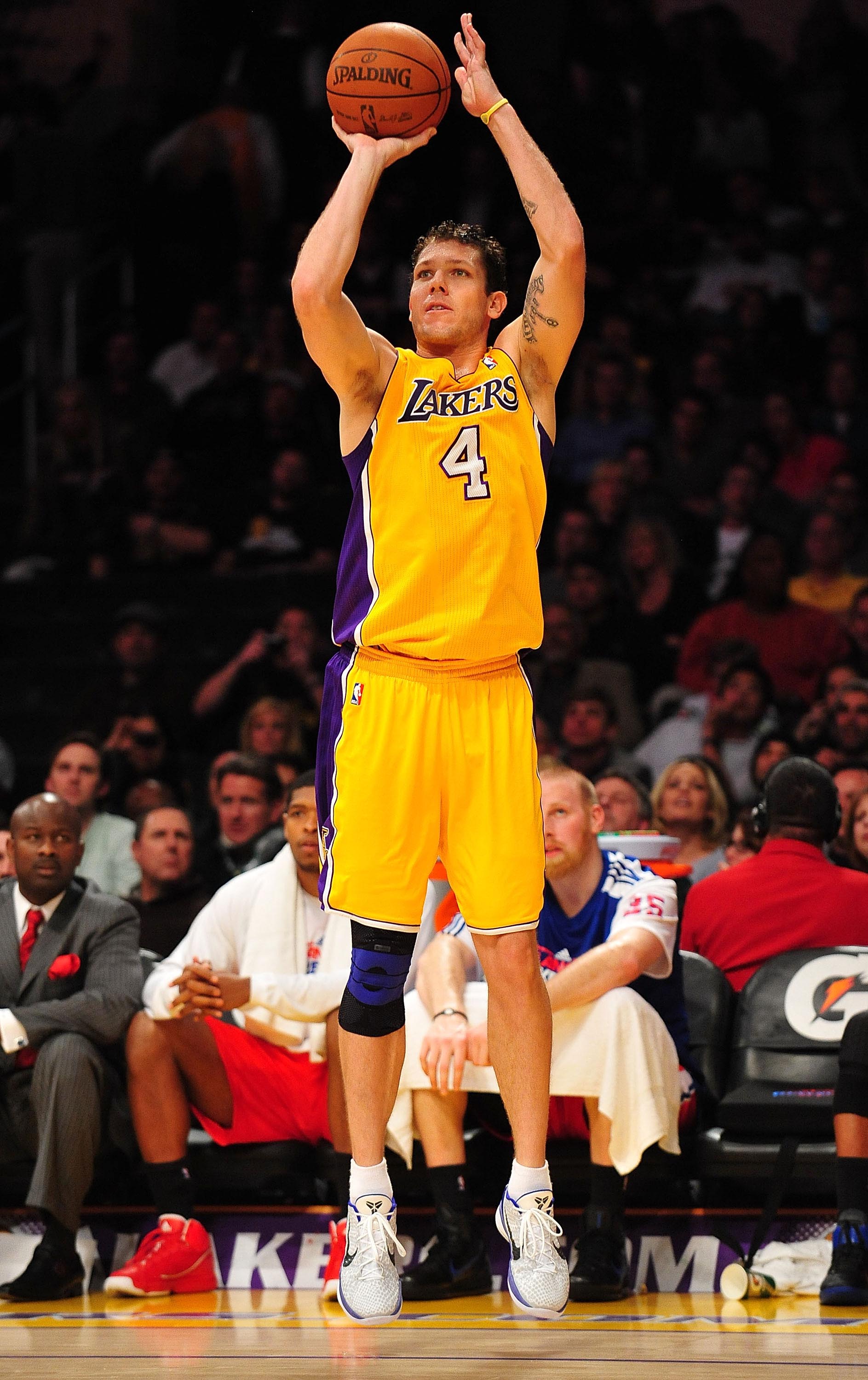
Career Stats With The Lakers: 4.3 PPG, 2.3 RPG, 1.7 APG, 0.5 SPG, 0.1 BPG
Career Achievements With The Lakers: 2x NBA Champion
Luke Walton’s role as the Los Angeles Lakers’ starting small forward during the 2006-2007 season was notable for several reasons. While he may not have been a prolific scorer, Walton’s contributions went beyond the box score. Known for his high basketball IQ, Walton served as a facilitator on the court while not generating assists numbers precisely.
His court vision and passing ability made him an excellent playmaker, complementing the scoring prowess of his teammates, including Kobe Bryant and Lamar Odom at the time. Defensively, Walton’s contributions were more cerebral than physical, as he relied on his basketball IQ to make timely steals and provide solid team defense.
While Walton was a steady team player, he was part of a difficult time in Lakers lore whereby Bryant was winning scoring titles and not achieving postseason success.
2008 – Vladimir Radmanovic
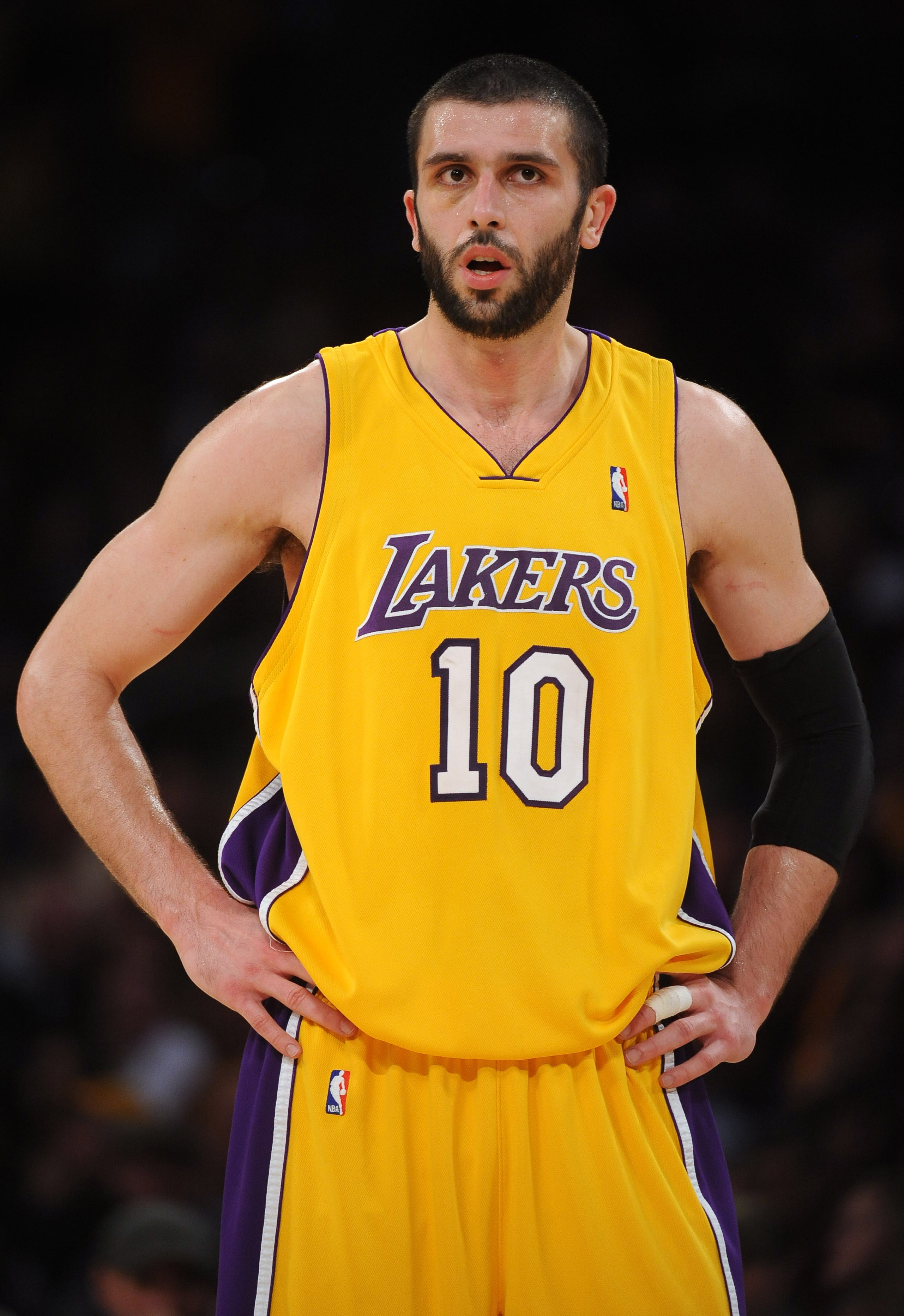
Career Stats With The Lakers: 7.1 PPG, 3.1 RPG, 1.4 APG, 0.6 SPG, 0.2 BPG
Career Achievements With The Lakers: N/A
Vladimir Radmanovic’s 2008 season as the Los Angeles Lakers’ starting small forward brought a mix of offensive versatility and challenges. His primary contribution came from his three-point shooting ability (40.6%), a valuable asset that stretched opposing defenses and created space for his teammates. While his scoring averaged 7.1 points per game, Radmanovic’s capability to score both inside and outside made him a flexible offensive option.
However, his defensive limitations were apparent, especially against stronger and more physical opponents. Despite these defensive challenges, Radmanovic played a role in the Lakers’ successful campaign to reach the NBA Finals in 2008, showcasing his importance as a starter during that season.
Although the Lakers fell short in the Finals, Radmanovic’s presence as a floor spacer and offensive contributor remained a notable part of their journey to contend for an NBA championship.
2009: Trevor Ariza
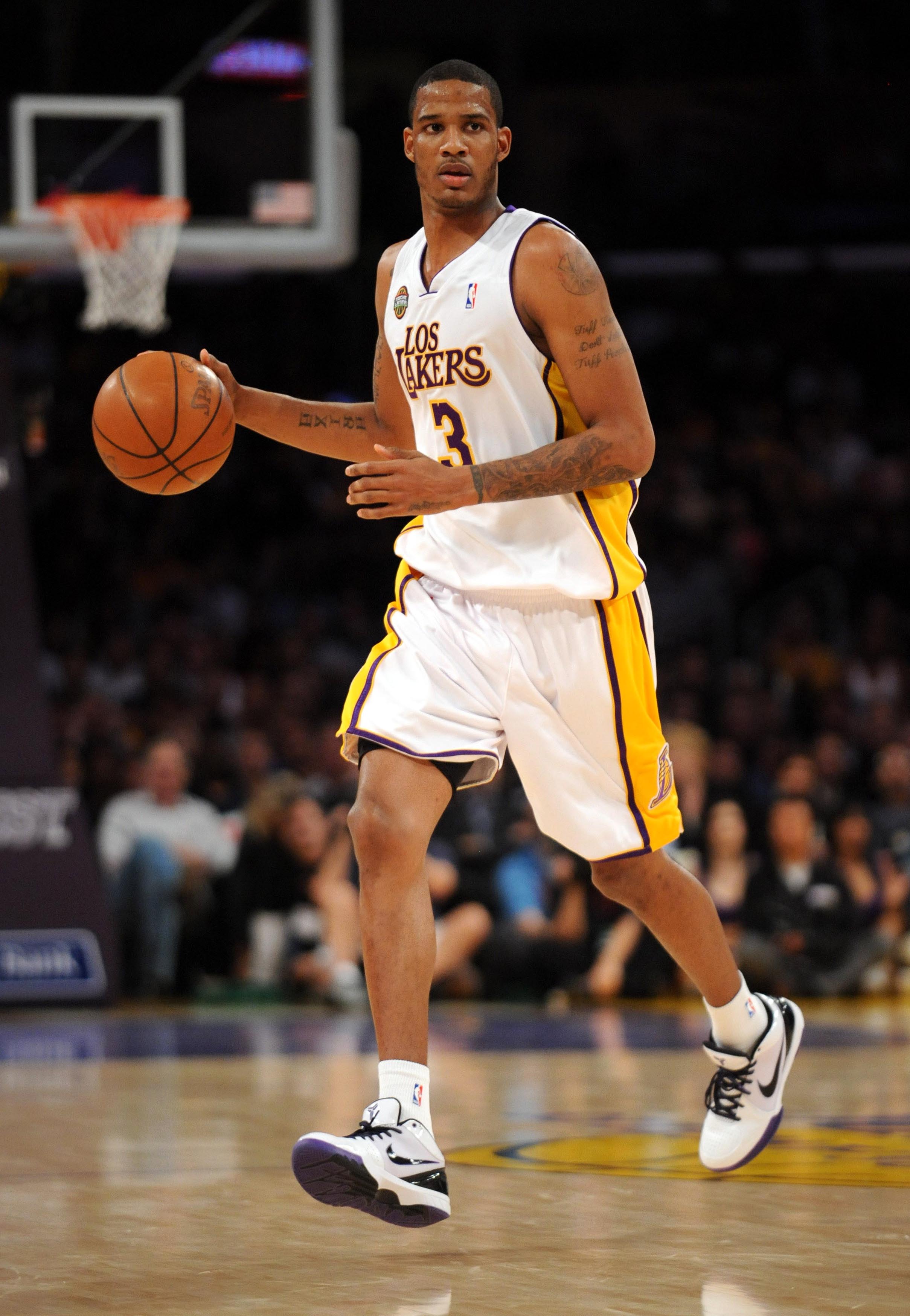
Career Stats With The Lakers: 7.5 PPG, 4.0 RPG, 1.6 APG, 1.4 SPG, 0.3 BPG
Career Achievements With The Lakers: 2008-09 NBA Champion
Trevor Ariza’s pivotal role as the Los Angeles Lakers’ starting small forward in 2009 was characterized by his defensive brilliance, athleticism, and contributions to the team’s championship success. His defensive prowess, marked by his ability to guard multiple positions and generate turnovers, was instrumental in solidifying the Lakers’ defense.
Ariza’s high-energy play, speed, and agility made him a valuable asset, particularly in fast-break situations, where he capitalized on scoring opportunities. Offensively, Ariza’s three-point shooting proficiency complemented the Lakers’ scoring arsenal, providing essential spacing as he shot 47.6% from deep in the playoffs.
However, his significance extended well beyond the stats, as he played a key role in the Lakers’ pursuit of an NBA championship in 2009, ultimately contributing to their title victory. The Lakers seemed to have success with defensive-minded wings who were always willing to do the dirty work.
2010-2013: Metta World Peace
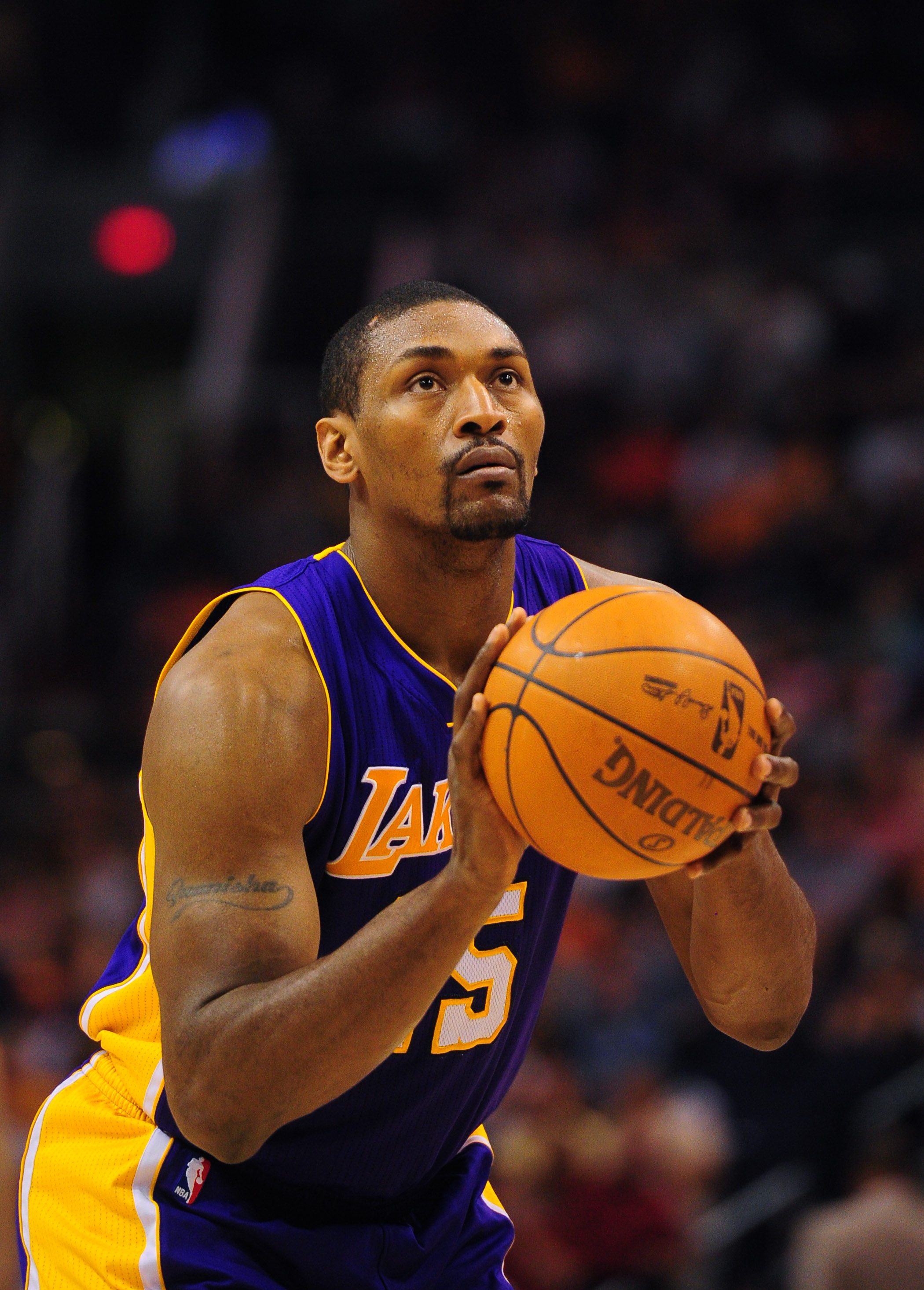
Career Stats With The Lakers: 8.7 PPG, 3.7 RPG, 2.9 APG, 0.9 SPG, 0.3 BPG
Career Achievements With The Lakers: 2009-10 NBA Champion, 2008-09 All-Defensive Team Selection
Metta World Peace’s tenure as the Los Angeles Lakers’ starting small forward from 2010 to 2013 was marked by his defensive tenacity and his unforgettable Game 7 moment in the 2010 NBA Finals. Renowned for his physicality and intensity on the defensive end, World Peace was a lockdown defender who could guard the opposing team’s best players.
His ability to disrupt passing lanes, contest shots, and create turnovers made him an integral part of the Lakers’ defense during this period. However, it was his iconic Game 7 moment in the 2010 NBA Finals that will forever be etched in Lakers history.
With just under two minutes remaining in a closely contested game against the Boston Celtics, World Peace drained a crucial three-pointer, helping to secure a championship for the Lakers. His clutch shot not only sealed the victory but also added another chapter to the Lakers-Celtics rivalry, solidifying his place in Lakers lore.
World Peace’s time with the Lakers was characterized by his defensive excellence and his ability to contribute in crucial moments. While his offensive output varied, his impact on the defensive end and his memorable Game 7 heroics in the 2010 Finals left an indelible mark on the franchise and endeared him to Lakers fans worldwide.
2014-2015: Wesley Johnson
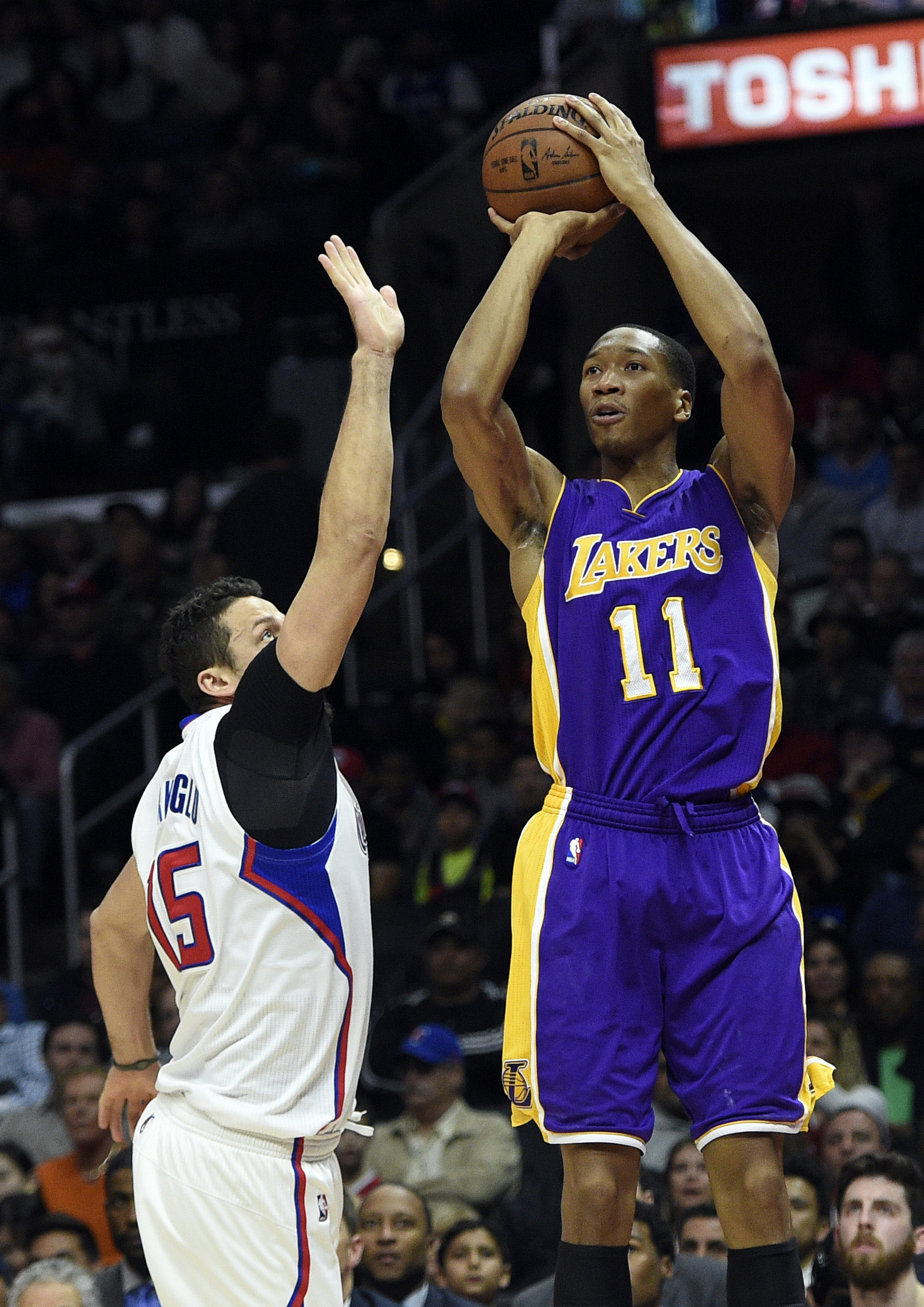
Career Stats With The Lakers: 9.5 PPG, 4.3 RPG, 1.6 APG, 0.9 SPG, 0.8 BPG
Career Achievements With The Lakers: N/A
Wesley Johnson’s tenure as the Los Angeles Lakers starting small forward in the 2014 and 2015 seasons coincided with a challenging phase for the franchise. While not a standout scorer, Johnson brought athleticism and defensive effort to the team.
His shot-blocking and steal capabilities made him a valuable contributor to the Lakers’ defensive schemes. On the offensive end, he chipped in with 9.5 points per game and provided an occasional three-point threat.
The 2014 and 2015 seasons represented a transitional period for the Lakers, as they were focused on rebuilding and developing young talent. Though the team did not experience significant playoff success during this time as they missed the postseason twice, Johnson’s contributions were part of the broader effort to shape the Lakers’ future.
2016: Anthony Brown
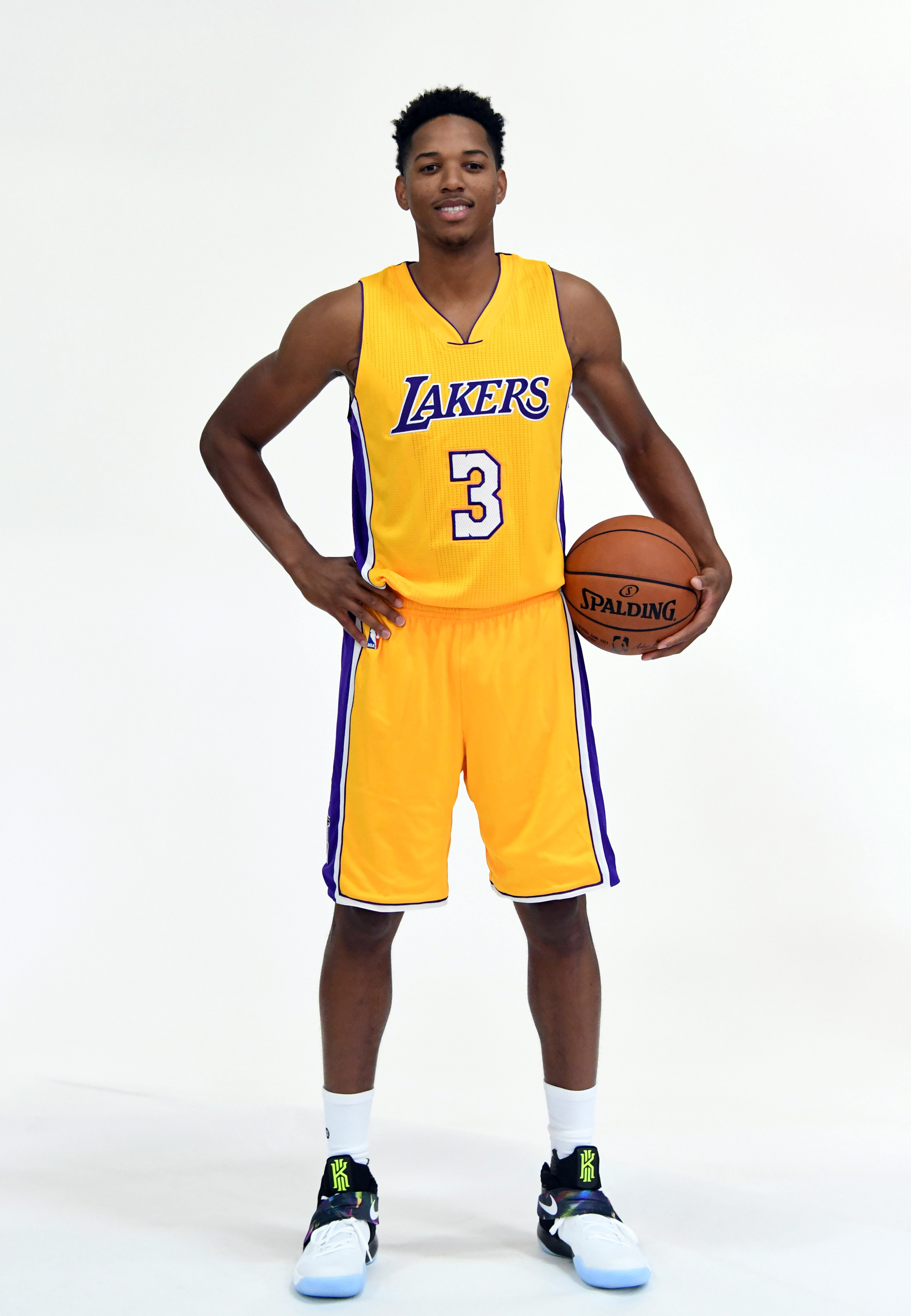
Career Stats With The Lakers: 4.0 PPG, 2.4 RPG, 0.7 APG, 0.5 SPG, 0.2 BPG
Career Achievements With The Lakers: N/A
Anthony Brown’s season as the Los Angeles Lakers’ starting small forward in 2016 was emblematic of the team’s commitment to developing young talent during a transitional phase. While Brown showcased potential on the defensive end, with the ability to guard multiple positions and become a reliable perimeter defender, his offensive impact remained limited, averaging 4.0 points per game.
As part of the Lakers’ larger strategy, Brown’s presence in the starting lineup exemplified the team’s focus on nurturing emerging players and building for the future. The season might not have translated into immediate on-court success in terms of wins and losses, but it was a testament to the organization’s dedication to player development and the belief in the potential of their young core.
2017-2018: Brandon Ingram
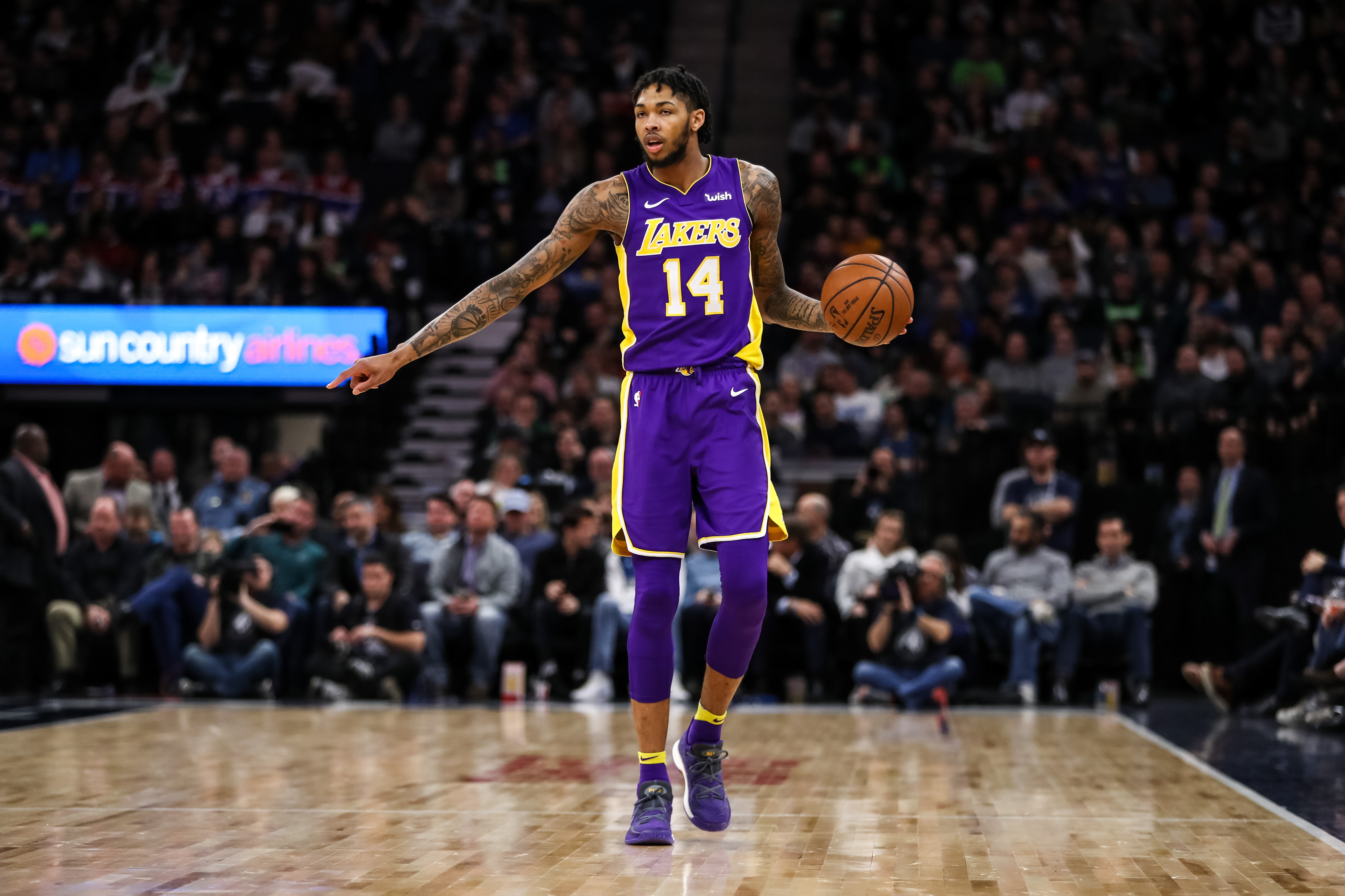
Career Stats With The Lakers: 13.9 PPG, 4.7 RPG, 2.9 APG, 0.6 SPG, 0.6 BPG
Career Achievements With The Lakers: 2016-17 All-Rookie Team Selection
Brandon Ingram’s stint as the Los Angeles Lakers starting small forward from 2017 to 2018 signified a pivotal period in the franchise’s rebuilding efforts. During this time, Ingram emerged as one of the Lakers’ rising stars, showcasing his scoring versatility and offensive prowess as the No. 2 overall pick in the 2016 NBA Draft.
His ability to score from various positions on the court, coupled with his double-digit scoring average, marked him as a potential primary scorer for the team.
While Ingram’s offensive talents were evident, he also displayed growth on the defensive end, utilizing his length and athleticism to disrupt passing lanes and contribute to the Lakers’ defensive efforts. His development was part of the larger strategy to build around a youthful core of talent, including players like Lonzo Ball and Kyle Kuzma.
The Lakers were in the midst of a transition period, working to reshape their identity and competitiveness. Ingram’s emergence as a burgeoning star was a promising sign for the team’s future, and he represented a crucial part of the Lakers’ ongoing efforts to rebuild and position themselves for success in the seasons ahead.
2019: LeBron James
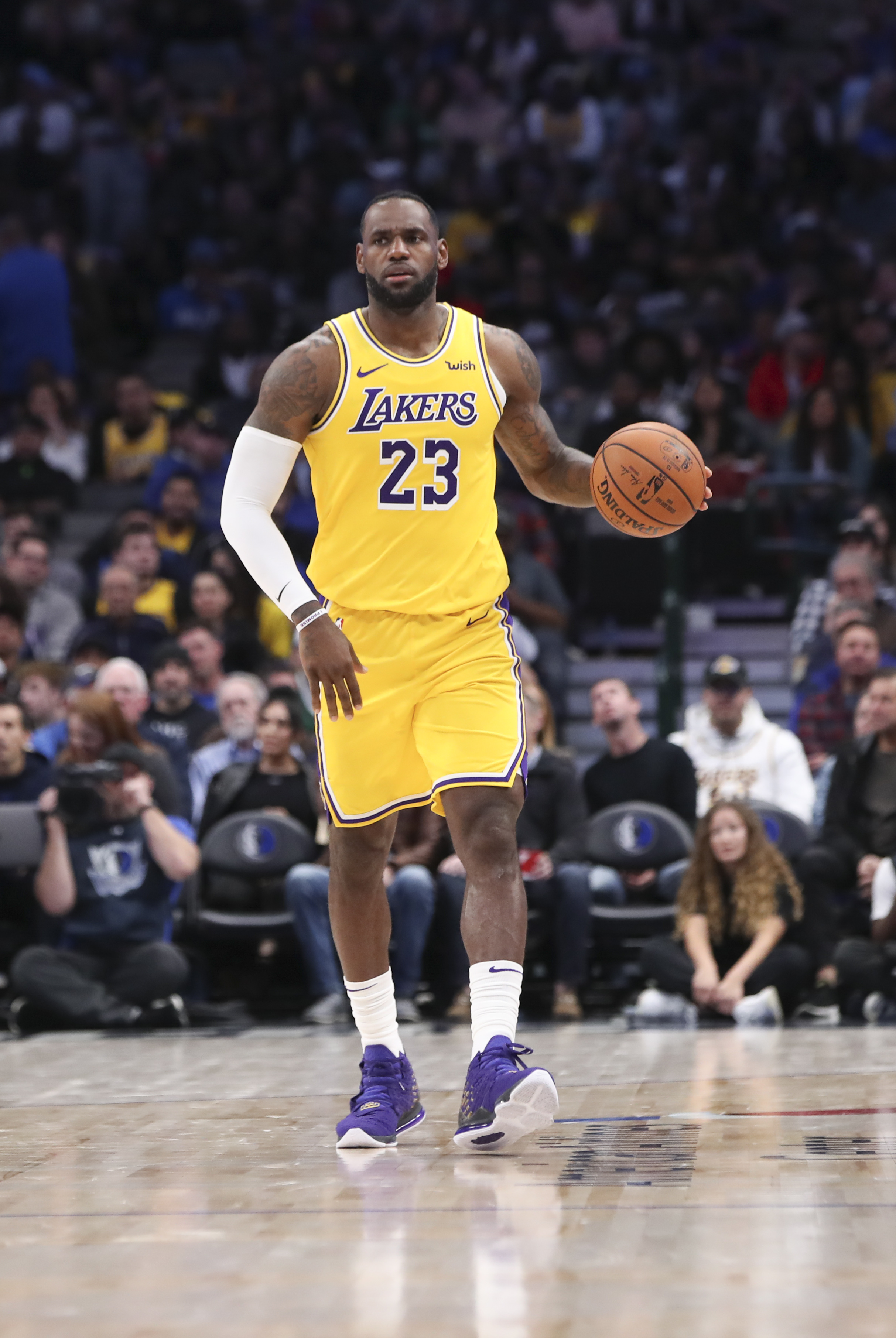
Career Stats With The Lakers: 27.4 PPG, 8.1 RPG, 8.0 APG, 1.2 SPG, 0.7 BPG
Career Achievements With The Lakers: 2019-20 NBA Champion, 2019-20 Finals MVP, 5x All-Star, 5x All-NBA Team Selection, 2019-20 Assist Champion
LeBron James’ arrival as the Los Angeles Lakers’ starting small forward in 2019 was a game-changing moment for the franchise. One of the greatest basketball players of all time, LeBron brought with him a wealth of experience, leadership, and unmatched basketball IQ. His impact was immediate and profound, both on and off the court after he signed a 4-years, $153 million deal.
On the court, LeBron James continued to demonstrate his exceptional scoring ability, playmaking skills, and versatility. He averaged double-digit points, rebounds, and assists during his time as the starting small forward, showcasing his ability to impact every facet of the game.
LeBron’s basketball IQ and court vision elevated the play of his teammates, and he became a catalyst for the Lakers’ offensive and defensive schemes. Off the court, LeBron’s leadership and championship pedigree provided invaluable guidance to a young Lakers roster.
His presence helped instill a winning culture and a sense of accountability among the players. Although the 2019 season was a difficult one as James only played 55 games and the team only won 37 games and missed the playoffs, good things would be on the way.
2020: Kentavious Caldwell-Pope
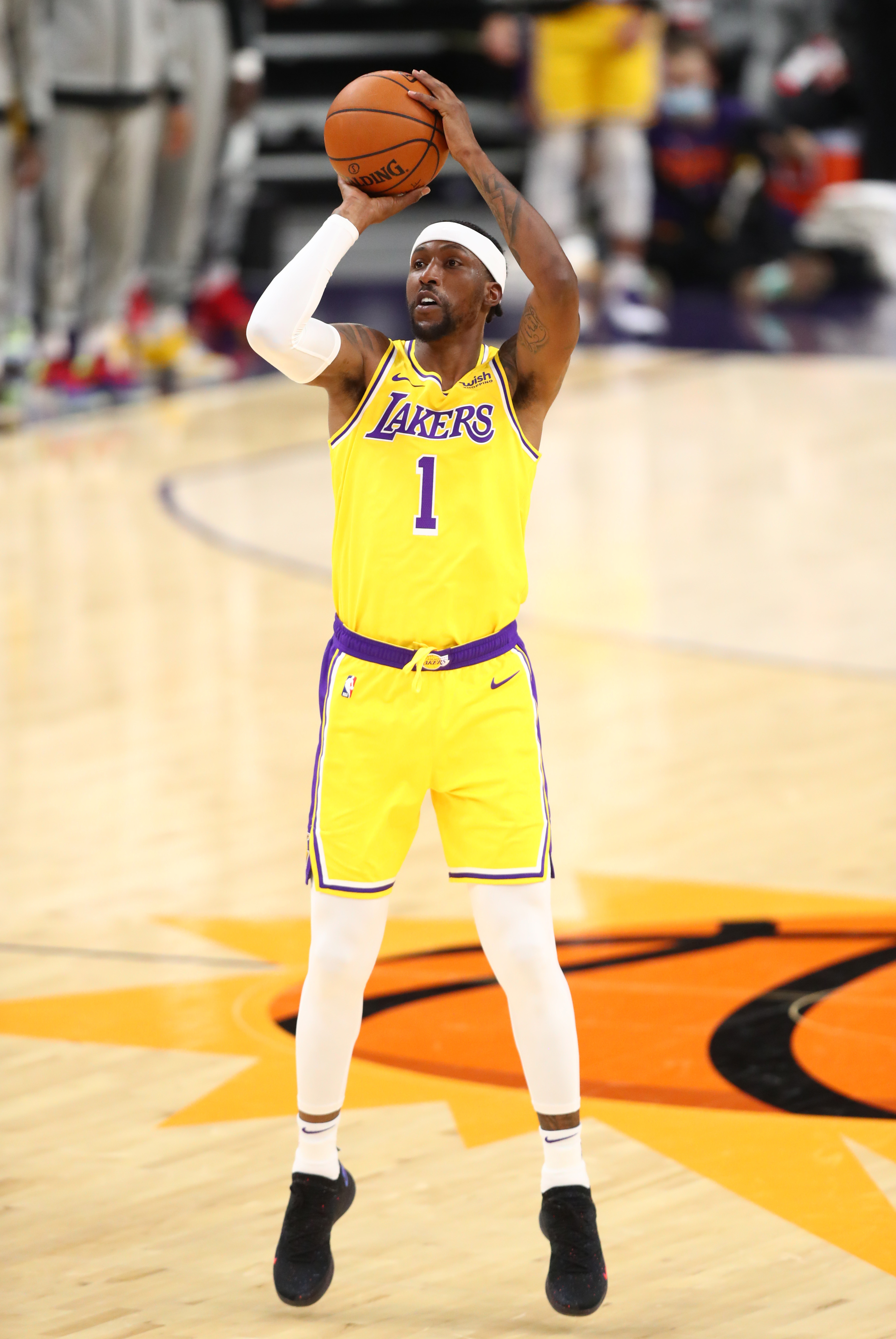
Career Stats With The Lakers: 11.1 PPG, 3.2 RPG, 1.7 APG, 1.0 SPG, 0.2 BPG
Career Achievements With The Lakers: 2019-20 NBA Champion
The Lakers shuffled their starting lineup a few times with the likes of Danny Green and Kyle Kuzma spending time on the wings while LeBron James handled point guard duties. It was Kentavious Caldwell-Pope who played on the wing most of the time and brought a mix of shooting and perimeter defense to the Lakers starting lineup.
Caldwell-Pope shot 38.5% from three during the regular season and averaged 37.8% from deep in the playoffs, highlighting his consistency as a shooter and marksman who benefitted from the presence of LeBron James and Anthony Davis. There was no doubt that Caldwell-Pope was the best and most reliable shooter on the team.
Due to the Lakers’ elite defense spearheaded by Cladwell-Pope, Green, and Alex Caruso, the team stifled teams en route to the NBA Finals where James and Davis led the way to a championship victory. Since then, however, the Lakers have been unable to find their defensive identity.
2021: Kyle Kuzma
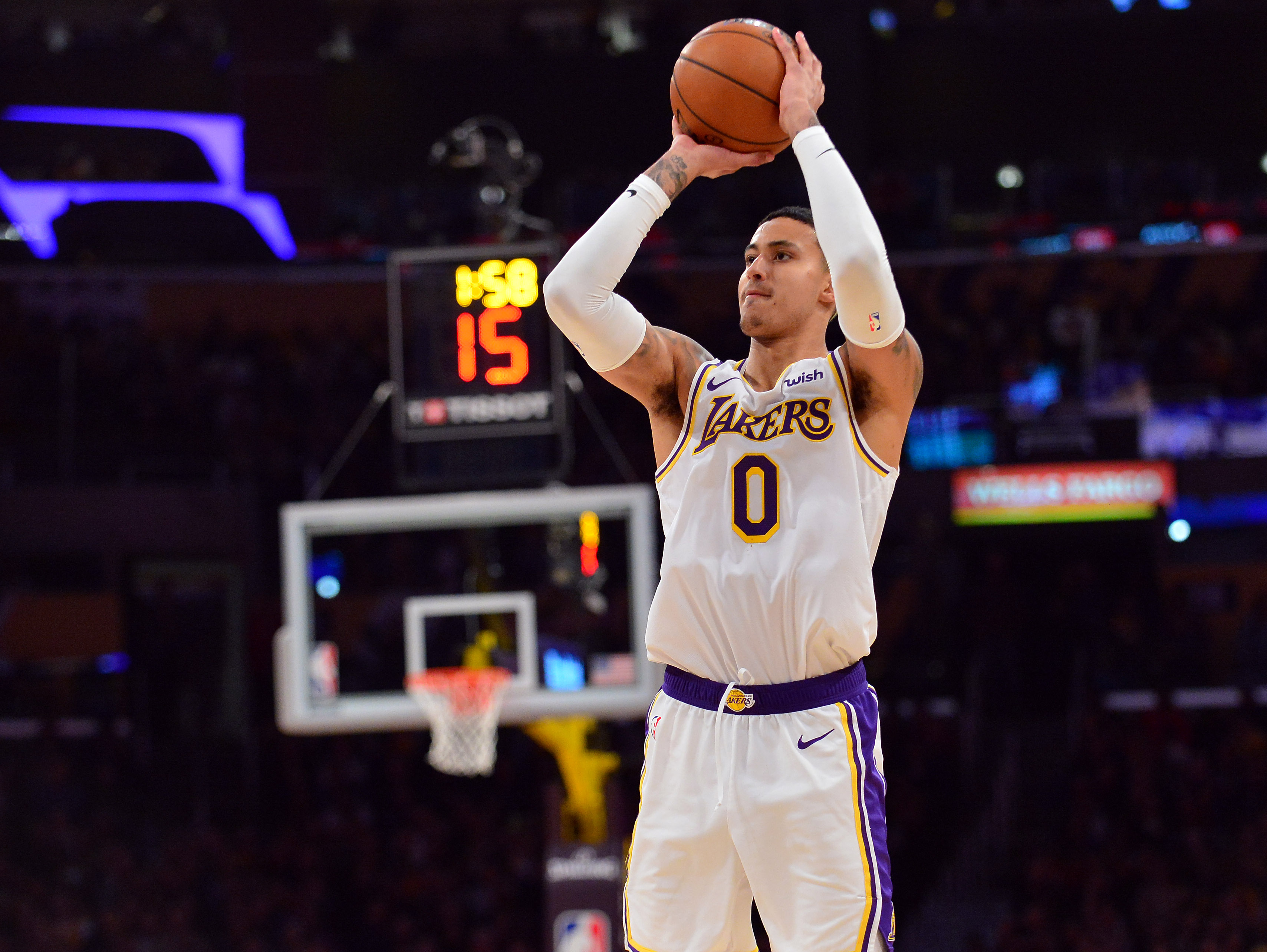
Career Stats With The Lakers: 15.2 PPG, 5.6 RPG, 1.9 APG, 0.6 SPG, 0.5 BPG
Career Achievements With The Lakers: 2019-20 NBA Champion, 2017-18 All-Rookie Team Selection
Kyle Kuzma’s role as the Los Angeles Lakers’ starting small forward in 2021 epitomized his growth and adaptability within the team’s dynamic. Known for his scoring versatility since making the 2018 All-Rookie Team, Kuzma brought a valuable offensive dimension to the team.
He could score from various positions on the floor, whether it was knocking down perimeter shots, driving to the basket, or using his post-up skills. He averaged 12.9 points per game in the regular season but only 6.3 points per game in the playoffs.
While not a lockdown defender, Kuzma contributed to the team’s defensive efforts and continued to work on that aspect of his game. His role as a supporting cast member alongside LeBron James and Anthony Davis was vital, as he provided scoring and energy off the bench when required and played a key part in the Lakers’ pursuit of success.
Kuzma’s season as the Lakers’ starting small forward in 2021 reflected his ongoing development as an NBA player. He was in the process of fine-tuning his skills to fit seamlessly into the Lakers’ system and contribute to the team’s ultimate goal of contending for another NBA championship although they never got there.
2022-24: LeBron James
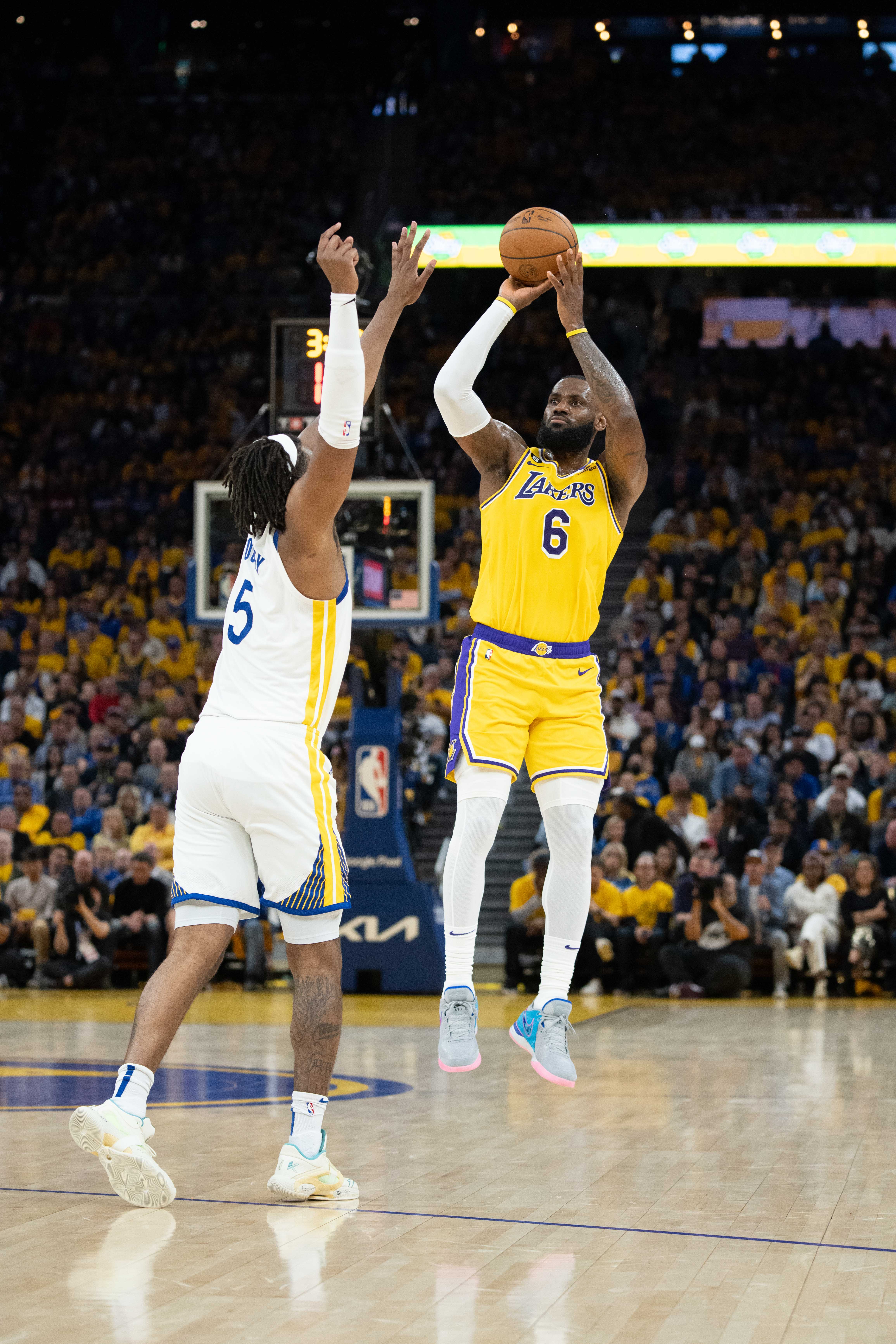
Career Stats With The Lakers: 27.4 PPG, 8.1 RPG, 8.0 APG, 1.2 SPG, 0.7 BPG
Career Achievements With The Lakers: 2019-20 NBA Champion, 2019-20 Finals MVP, 5x All-Star, 5x All-NBA Team Selection, 2019-20 Assist Champion
LeBron James was the superstar of the Lakers during the 2020 championship run by primarily playing point guard. He also competed as the starting power forward and center although he was at his best as the small forward.
The King had to endure a difficult 2022 campaign, missing the playoffs as he was unavailable for most of the year. James played 56 games during the year and had to write off the season despite averaging 30.3 points per game at 37 years old.
However, in 2023, James was even better. The team acquired Jarred Vanderbilt at the trade deadline and the power forward proved to be an exceptional defensive stopper. That allowed James the freedom to handle the ball as a point-forward and he led the team to the Western Conference Finals in a losing effort to the eventual champions Denver Nuggets.
Still, James had a terrific 2023 campaign by averaging 28.9 points per game on 50.0% shooting from the field and also broke Kareem Abdul-Jabbar’s all-time scoring record.
In 2024, despite being 39 years old, James averaged 25.7 points and 8.3 assists per game on 54.0% shooting from the field. Going forward and as long as James is healthy, he should return as the starting small forward while Jarred Vanderbilt, Anthony Davis, and even Rui Hachimura occupy the frontcourt most of the time.

